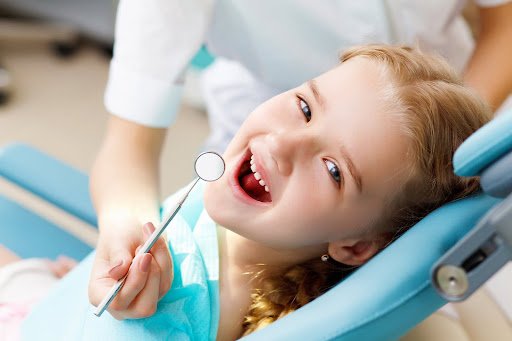Children's smiles undergo continuous development and change, just like everything else. There are numerous transformations, from the appearance of their first tooth to the emergence of their final permanent tooth.
Due to the complexity of these changes, several misconceptions about children's teeth have arisen over time. As dedicated dentists in Mckinney, TX, at Valley Creek Dental Care, we aim to dispel these common myths about baby teeth and provide accurate information.
Let's begin!
Myth 1: Kids Are Capable Of Brushing Their Teeth
Children can't properly brush and floss their teeth effectively until they are much older. When five-year-olds brush their teeth, they can only clean their teeth surfaces. Parents should help them brush and floss for babies and toddlers.
You can let preschoolers brush their teeth, but it's a good idea to check afterward to ensure they don't miss any spots. As professional dentists in Mckinney, TX, we suggest supervising your children's teeth, brushing and flossing until they turn seven or eight.
Myth 2: Kids Should Avoid Dental X-Rays Due To Safety Concerns
Getting dental X-rays is usually more helpful than risky. In our dental practice, we use advanced technology specifically designed for children. These digital X-rays expose kids to much less radiation than traditional X-rays. As the best Valley Creek Family Dentistry, We ensure proper shielding and only take X-rays when necessary rather than routinely.
X-rays help dentists to see areas between teeth, inside the teeth, and below the gum line that are not visible to the naked eye. By detecting problems early, we can provide easier and less invasive treatments, keeping your child's smile healthy and bright.
Myth 3: My Child Can Visit The Same Valley Creek Family Dentistry as I do
While it's true that families can choose any dentist for their children, there are significant advantages to visiting a pediatric dentist. These dental specialists undergo two extra years of training in a residency program after dental school. During this time, they learn about the specific dental requirements of children and acquire behavioral techniques that help them feel more comfortable during dental visits.
Therefore, this specialized training ensures that children receive the necessary care and have a positive experience at the dentist. While general dentistry practices may also treat kids effectively, pediatric dentists have expertise tailored to children's dental needs.
Myth 4: Babies Require Dental Visits After All Teeth Erupt
It's important to schedule your baby's first dental visit when they are one year old. This is because even with just one tooth, babies can develop cavities. During this visit, the expert dentists at Mckinney, TX, will ensure your baby's teeth and gums are healthy. They will help you establish a good oral care routine and check that your oral and dental development is progressing well.
Moreover, starting dental visits early helps children become familiar with the dentist's office environment, the sounds, and the staff. It also allows them to build a positive relationship with the dentist and the dental team. This helps children feel more comfortable and makes future visits easier and stress-free for you and your child.
Myth 5: Mamelons On Teeth Are A Sign Of Dental Problems
One myth about mamelons on teeth is that they indicate dental problems or abnormalities. No, this is not the truth! Mamelons are naturally occurring on permanent incisor teeth and are characterized by small, rounded bumps or ridges on the edges of the teeth. However, some people mistakenly believe that mamelons indicate irregular tooth development or the need for orthodontic treatment.
In reality, mamelons, or ridges on teeth, are typically present on newly erupted adult incisor teeth and gradually wear down over time through normal biting and chewing. They are generally considered a normal variation of tooth anatomy and do not require any treatment or intervention.
Myth 6: Fluoride Overdose Prevents Cavities
Fluoride is vital for strengthening kids' teeth and preventing cavities. It can even reverse early tooth decay by repairing weak areas of the enamel, despite myths suggesting it's not good for baby teeth. Children receiving enough fluoride while developing their teeth benefit their permanent teeth in the long run. However, some kids don't get sufficient fluoride, especially if they drink only bottled water or live in areas without fluoridated tap water.
However, it's important to note that too much fluoride can also cause fluorosis, which can discolor permanent teeth. To ensure adequate fluoride intake, use a tiny smear of fluoride toothpaste for kids as soon as their first tooth appears. Use a pea-sized amount from ages three to six and ensure kids spit out excess toothpaste.
Older kids only need a thin ribbon. Wait until around age six to introduce fluoride mouthwashes. During your child's visit to our Valley Creek Family Dentistry, experts will discuss the fluoride intake and determine if a fluoride treatment would be beneficial.
Myth 7: Kids Should Begin Flossing With Permanent Teeth
It is a myth that kids should only start flossing when their permanent teeth come in. Flossing is pertinent for kids to remove plaque. It is a sticky film that can cause tooth decay and gum disease.
As baby teeth are temporary, they play a vital role, so keeping them healthy and free from cavities is crucial. When your baby's teeth touch each other, it's time to start flossing once daily to keep their teeth and gums in good shape.
Summary!
So, now you know the myths and facts about dental care for kids. For your kids, dental visits are essential. If your child hasn’t had their annual dental checkup yet, then make sure to schedule an appointment soon.
Valley Creek Family Dentistry is dedicated to providing fuss-free oral care. We achieve it by performing only the necessary dental procedures, including pediatric dental treatment and cleaning.
Visit us today and let our skilled and caring dentists help you and your baby have a healthy smile.


